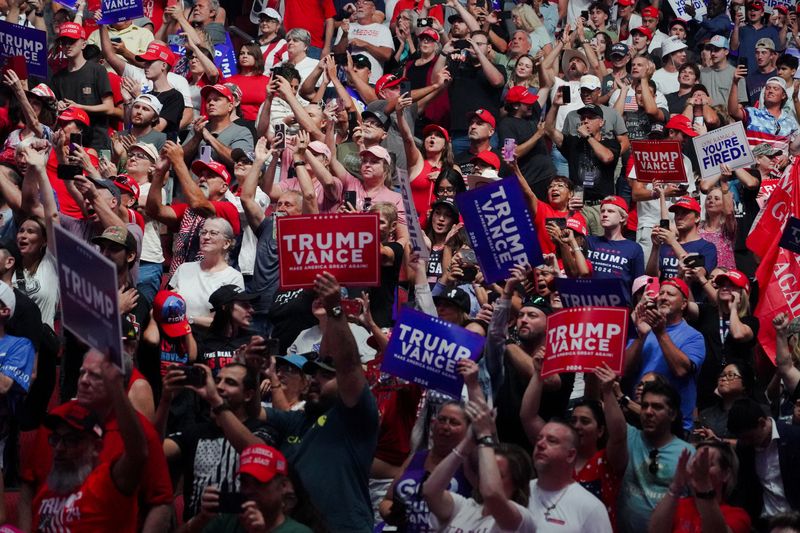(Reuters) -Donald Trump, touting plans on taxes and health, tried on Friday to turn the page on a week in which he was overshadowed by Kamala Harris and struggled to focus on policy issues instead of personal attacks on his opponent in the U.S. presidential race.
From a lectern at a Mexican restaurant in Las Vegas, the Republican candidate spoke about his plan to eliminate taxes on tips to waiters and other service employees. He discussed his campaign’s efforts to court Hispanic voters in Nevada, a battleground state that could help determine the Nov. 5 election, and nationwide.
The tax proposal, a pillar of Trump’s economic agenda, is the kind of issue his advisers have been pressing him to focus on, rather than his frequent personal attacks against Vice President Harris’ looks, Black and Indian heritage and intelligence, warning they could turn off the moderate voters he needs to win.
At an event in Arizona later, the former president repeated his tax pledge, while promising to set up a commission to investigate presidential assassination attempts. He also said he would install a panel to investigate “an increase in chronic health problems and childhood diseases.”
Both proposals are apparent concessions to independent presidential candidate Robert F. Kennedy Jr., who endorsed Trump at the event after dropping out of the race.
Trump’s comments come one day after Harris accepted the Democratic Party’s presidential nomination with a muscular speech that laid down broad foreign policy principles and sharp contrasts with Trump with 11 weeks left until Election Day.
Trump sought to counter-program the four-day convention with events of his own around the country, hoping to steal some media attention from Harris. However, his speeches on foreign policy, the economy and crime did little to dislodge the spotlight from Harris and received little attention – a stunning turnabout for a politician used to dominating headlines.
The Republican and his aides hope Thursday’s boisterous convention finale marks the end of the honeymoon period for Harris, who emerged as the Democratic candidate little more than a month ago, after President Joe Biden exited the race and endorsed her.
During Harris’ acceptance speech in Chicago, Trump attacked her with dozens of posts on his Truth Social platform, calling her a liar, a Marxist and “Comrade Kamala Harris.” One post simply asked: “IS SHE TALKING ABOUT ME?”
William Rosenberg, a political science professor at Drexel University, said Trump’s personal attacks on Harris underscored his frustration with having to face a biracial woman, a task complicated by his history of making racist remarks.
“His anger and his words speak volumes,” Rosenberg said. “He’s navigating a path which is full of problems for him.”
Harris has surged in the polls since entering the race, with polling aggregator website FiveThirtyEight putting her ahead of Trump in six of seven battleground states.
She is also outraising her Republican counterpart. Her campaign told the Federal Election Commission this week that it raised $204 million last month, compared to $48 million reported to the body by Trump’s main fundraising group.
One question still to be answered is whether Harris will also outpace Trump on the trail in the coming weeks. Biden, 81, made relatively few campaign stops, easing pressure on Trump to travel more around the country. That may now change with Harris, 59.
Trump, 78, will travel to Detroit on Monday to address a conference of the National Guard Association of the United States and is scheduled to give a speech at a conservative women’s group’s annual summit in Washington on Friday.
Campaign spokesperson Karoline Leavitt said Trump would hold at least one additional campaign stop between those two events, without providing details.
The Harris campaign has not yet released details of her movements for next week.
Leavitt blamed the media for focusing their stories on Trump’s personal attacks, which she said made up a fraction of his otherwise policy-heavy rallies and speeches.
At a speech event on Wednesday in Asheboro, North Carolina, billed as one on national security, Trump said he had rejected the recommendations of his advisers to focus on policy, and he insulted Harris and other Democrats in personal terms.
He again recounted those conversations with advisers at the rally in Arizona on Friday.
“My geniuses, they get paid a fortune – actually not that much – but I call up my people, I say, ‘They’re knocking the hell out of me, and you say I shouldn’t get personal. I have to get personal, don’t I?'” Trump said to applause.

An outside adviser to Trump told Reuters on condition of anonymity that several advisers had told the former president that a continued focus on insults rather than policy could doom his chances in November.
Republican strategist Doug Heye said Trump could still win the race, which he predicted would be close, but to do that he should focus on inflation, illegal immigration and other issues that polling show many voters give him higher marks on.
To read the full article, Click Here

